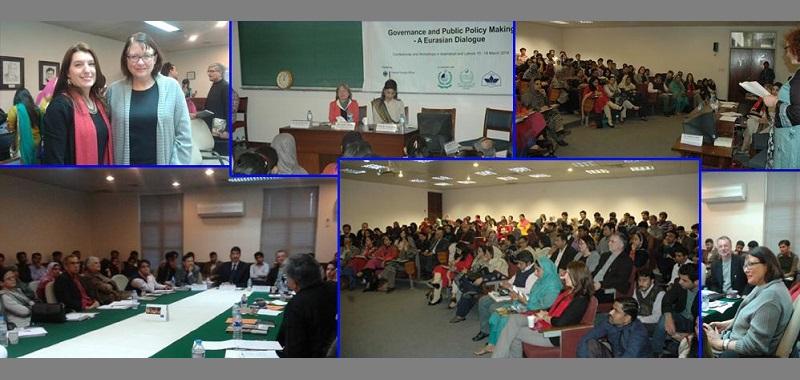
The LUMS Department of Humanities and Social Sciences and DAAD Islamabad organised a conference on Governance and Public Policy-Making: A Eurasian Dialogue on March 13, 2014 at LUMS. The conference was organised by Prof. Mohammad Waseem (LUMS), Prof. Andrea Fleschenberg (Quaid e Azam University) and Ms. Asma Faiz (LUMS).
This conference was a part of a series of conferences that have been organised by DAAD, LUMS, HEC and Quaid-e- Azam University (QAU) to discuss good governance and public policy making. The conference held at LUMS specifically discussed ‘Experiences of Transcending Governance – Policy-Making, Interventions and Migration in Multilevel Governance Contexts.’ The participants were welcomed by Prof. Mohammad Waseem, Department of Humanities and Social Sciences at LUMS, Dr. S. Sohail H. Naqvi, VC LUMS and Ms. Ivana Olic de Oliveira, DAAD Bonn. The participants of the conference included representatives from HEC, faculty members and students from various universities of Lahore like Kinnaird College for Women, Lahore College for Women University, University of the Punjab and Quaid- e- Azam University, Islamabad.
The first panel discussion was on the topic ‘Multi- Level Governance and Subsidiarity- A tool for conflict Mediation and Prevention?’ The panelists included Prof. Mohammad Waseem and PD Dr. Jocehn Hippler, University of Duisburg-Essen. This discussion was moderated by Ms. Asma Faiz, LUMS and generated a very interesting debate among the participants. The second panel discussion on ‘Migration, Participation and Subsidiarity’ was moderated by PD Dr. Andrea Fleschenberg. The panelists included Dr. Sanaa Alimia, School of Oriental and African Studies, University of London, Professor Dr. Ursula Brsl, Phillips University Marburg and Prof. Dr. Beatrice Knerr, University of Kassel.
The third panel was on ‘Intervening for good governance-reviewing concerns, implications and conditionalities.’ It was moderated by Prof. Mohammad Waseem and the panelists included Dr. Rubina Saigol, an independent researcher, Lahore, Prof. Dr Akbar S. Zaidi, University of Karachi and Mr. Kristof Duwaerts, Hanns-Seidel-Foundation.
The conference generated a lot of positive arguments and debate and discussed good governance in developing and developed countries. Appreciating the number of questions raised by the participants, Dr. Sohail Naqvi said that the success of a conference can be judged by the number of questions raised rather than the number of answers given.
DAAD Bonn representative, Ms. Ivana Olic de Oliveira said that this exchange programme focuses on providing skills to people to apply good governance practices in their countries themselves, rather than setting up organisations that would provide this function. Ms. Ursula Saarbeck, Director, DAAD Information Centre Islamabad spoke about the exchange programmes offered by DAAD and said that among the 90 developing countries that DAAD wants to collaborate with, since 2013, Pakistan is being given special focus. “Observing the enthusiasm of the Pakistani students to study in Germany, the German Federal Foreign Office, in 2013 allocated extra funds to DAAD in order to finance more Masters degree programmes, workshops and study trips for Pakistani fellows and thus foster the political and cultural dialogue between the two countries. This initiative not only supports Pakistani graduate students in connecting with international research but also contributes to a better understanding of Pakistani society and politics at German universities and in German society. We want to encourage dialogue between the people so they can discuss their challenges and competencies and apply the conclusions to solve issues arising in their society.”
Since 2009, the DAAD funding programme “Public Policy and Good Governance (PPGG)” has been supporting future leaders from developing countries to promote democracy and social justice in their home countries and to address the challenges of a globalised world. The programme offers scholarships for selected Masters degrees in German Universities. To date, 23 Pakistani graduates have been admitted to these courses. This series of international conferences and workshops is a part of this initiative and presented a programme with high academic standards with reputed political scientists from Pakistan , Germany and the UK.
The conference was divided into four areas in the field of governance studies to discuss specific dimensions as well as key issues. The four areas were : Informality- unwritten constitutions and rules shaping normative regimes, stakeholders and practices of governance; Subsidiarity – negotiating governance and public policy making in multilevel systems and heterogeneous societies eg via decentralization; Conditionality and Intervention – multiple governance interventions – either implicitly or explicitly placed under the debated good governance paradigm and /or conditionalities – have been taking place in the global south, directed or supported by a series of different international or national characters and Participation – voices and agencies of sociopolitical actors are shaped and manifested differently in governance processes, can be asymmetrical, informal or formal in mature as well as increasingly mediated by new and old forms of participation.







